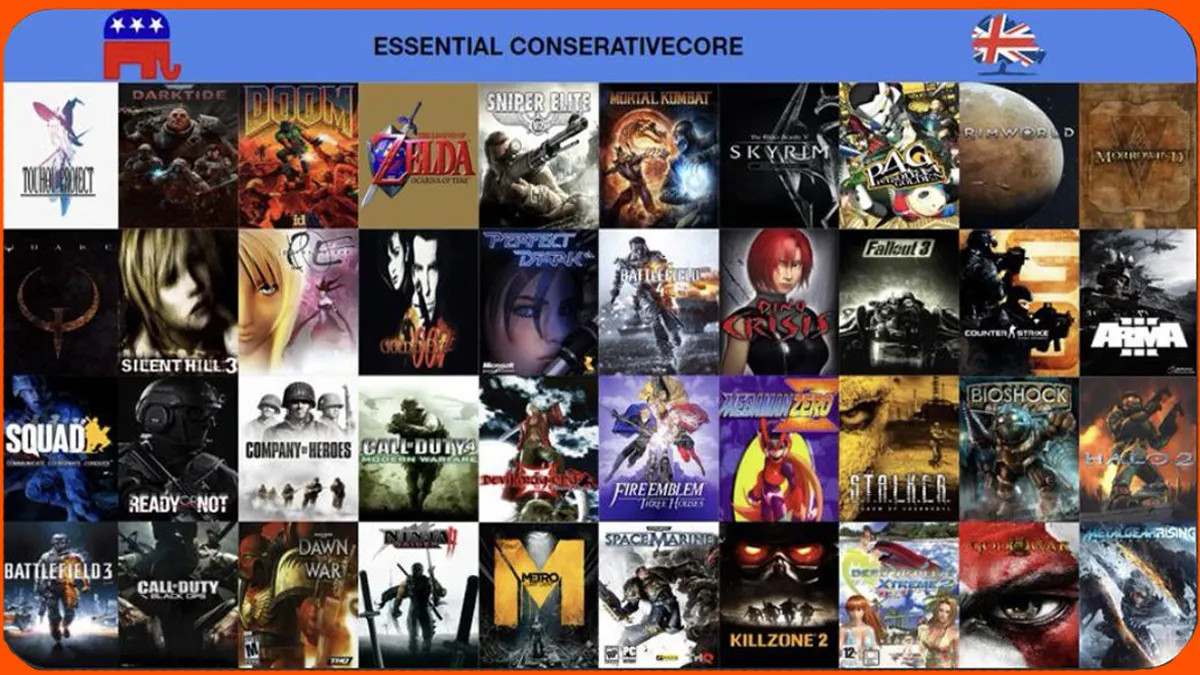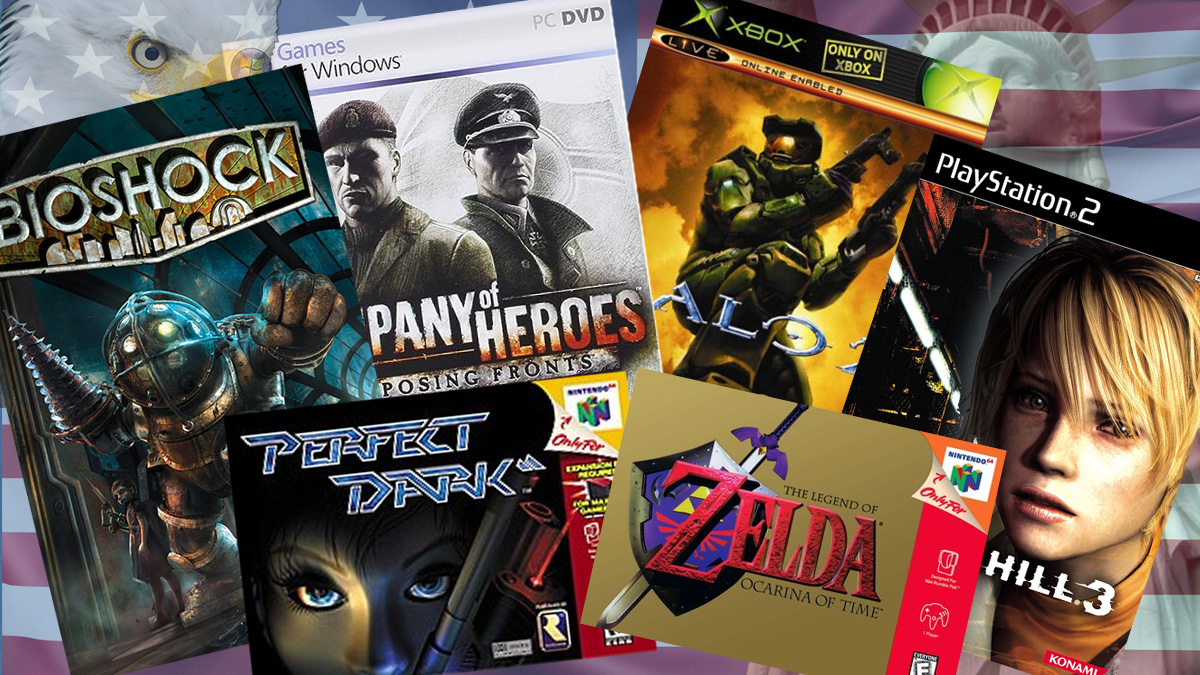Do video games reflect, reinforce, or even shape our political ideologies? The intersection of gaming and political thought, particularly conservatism, is a complex and often debated topic, sparking discussions about whether virtual worlds mirror real-world values.
The idea that certain games align with conservative principles is not new, but it has gained traction in recent online discussions. This exploration delves into how video games, intentionally or unintentionally, can embody conservative themes. The analysis extends to examining which titles are perceived as "conservative" and the reasoning behind these classifications.
One viewpoint argues that games with a capitalist framework, even if unintentional, can be interpreted as promoting conservative values. This perspective suggests that the core gameplay loops in many games implicitly reflect a conservative worldview, regardless of the developers' intentions. Others suggest the term "conservative games" is not easy to define, as most games don't overtly express political viewpoints. Some games get branded as conservative based on their themes, gameplay mechanics or the audiences they attract.
- Sam Witwer The Untold Story Of The Versatile Actor His Roles
- Daeg Faerch The Chilling Young Michael Myers Beyond
The question of whether Paradox games, known for their grand strategy titles, fall under the umbrella of "conservative games" is a point of contention. While these games often feature capitalist frameworks, some argue that this is simply a product of the hegemonic structures within the game and doesn't necessarily signify a promotion of conservatism. It's suggested that the games' mechanics might implicitly support conservative ideals at times, but this isn't the primary intent.
The discussion often extends beyond mere gameplay mechanics to encompass themes and narratives. Games that focus on tradition, duty, and hierarchical structures are sometimes viewed as aligning with conservative values. Conversely, games that challenge societal norms or promote progressive ideals may be seen as antithetical to conservatism. The reality is far more nuanced, with many games containing elements that appeal to players across the political spectrum.
Examples such as adaptations of conservative films into video games highlight the deliberate incorporation of specific ideologies into gaming. These adaptations often retain the themes of the original films, aiming to resonate with a conservative audience. However, as one critique mentions, such adaptations may suffer from poor graphics and shallow gameplay, undermining their message.
- Phyllis Clark The Untold Story Of Mr Ts Late Wife
- Michael Waltrip Nascar Girlfriends Amp Career Now Revealed
On the other hand, games like "Fire Emblem," with its focus on bonds, respect, and diverse origins, challenge the notion that conservatives only favor specific narratives. Similarly, "The Legend of Zelda," a beloved franchise, is cited as a counterpoint, suggesting that conservatives also appreciate wholesome and non-exploitative characters, such as the iconic "twink elf boy" Link.
The discussion extends to online communities, specifically subreddits dedicated to asking conservatives questions to better understand their perspectives. These forums often focus on US politics but welcome diverse topics from around the world. This engagement highlights the desire for dialogue and understanding between different political viewpoints within the gaming community and beyond.
Recent controversies, such as the lawsuit against Amazon and MrBeast's company (mrb2024) related to the reality series "Beast Games," also touch upon the intersection of gaming and broader social issues. While not directly related to political ideology, these incidents underscore the complexities and challenges facing the gaming industry.
The list of games with perceived conservative themes is a subject of ongoing debate. One list, containing 1601 titles, was last updated four hours ago, sparking discussion about the criteria used for inclusion. Captain Lamotu and the Monk have also delved into the topic, creating their own essential conservative core games list, inviting further analysis and debate.
The "conservative core games list" seems to be an ongoing project, generating discussion and curiosity about its criteria and purpose. The list's existence underscores the perceived connection between gaming and political ideology, prompting players to consider the values and messages embedded within their favorite games.
Ultimately, the perception of a game as "conservative" depends on individual interpretation and perspective. There is no definitive list of conservative games, as the lines between political ideology and entertainment are often blurred. However, exploring this intersection can lead to a deeper understanding of how games reflect, reinforce, or challenge our beliefs.
The ongoing discussions and debates surrounding the topic highlight the evolving nature of the gaming landscape and its relationship to culture and politics. As video games continue to grow in popularity and influence, understanding their potential impact on our perspectives becomes increasingly important.
While some may see the connection between gaming and conservatism as tenuous or contrived, the debate surrounding the topic raises important questions about the values and messages embedded within video games. By engaging in these discussions, players and developers can become more aware of the potential impact of games on society.
The exploration of "conservative games" also touches upon broader themes of cultural representation and diversity within the gaming industry. As the industry strives to become more inclusive, it's important to consider the perspectives of all players, regardless of their political beliefs.
The intersection of gaming and conservatism is not without its critics. Some argue that labeling games as "conservative" is overly simplistic and ignores the complexities of both gaming and political ideology. Others worry that such classifications could lead to further polarization within the gaming community.
The analysis of "conservative games" is an ongoing project. As new games are released and cultural values evolve, the debate surrounding the topic will undoubtedly continue. Engaging in this discussion is vital for fostering a more nuanced understanding of the relationship between gaming and political ideology.
As the gaming industry continues to evolve, understanding the potential impact of games on our perspectives is crucial. By engaging in open and respectful dialogue, we can foster a more nuanced understanding of the relationship between gaming and political ideology.
The question of whether video games can be inherently conservative is a complex one, with no easy answers. However, by exploring the values and messages embedded within games, we can gain a deeper understanding of their potential impact on our perspectives.
The ongoing discussions and debates surrounding the topic highlight the evolving nature of the gaming landscape and its relationship to culture and politics. This evolving landscape demands a critical approach to identifying the potential conservative values that can be portrayed within the games.
While some may view the connection between gaming and conservatism as a stretch, the debate surrounding the topic prompts us to consider the values and messages embedded within video games. Also the game development community needs to be more sensitive to the cultural, social and political background of their audiance.
The discussion has also opened a path for the game development community to be more sensitive to the cultural, social and political background of their audience. This can lead to creating games with better and positive values.
In conclusion, while a definitive list of "conservative games" remains elusive, the exploration of this intersection offers valuable insights into the complex relationship between gaming, culture, and political ideology. It encourages critical thinking about the values we consume and the potential influence of virtual worlds on our real-world perspectives.
Ultimately, the debate surrounding "conservative games" serves as a reminder of the pervasive influence of culture on all forms of media, including video games. By engaging in these discussions, we can become more conscious consumers and creators of content.
The conversation about "conservative games" needs to be ongoing. This allows for a deeper exploration of the interplay between gaming and political thought. It's a valuable exercise in media literacy.
It remains crucial to avoid generalizations and acknowledge that players from all political backgrounds enjoy a wide variety of games. The goal is not to create divisions but to foster a more nuanced understanding of the complex relationship between gaming and society.
As the gaming industry matures, a greater awareness of the potential political undertones in games can only enrich the experience. This can lead to more meaningful and thought-provoking entertainment for players of all persuasions.
The future of "conservative games" and their reception remains to be seen. But the conversations they spark will continue to shape the way we perceive and interact with virtual worlds.
- Meet Susan Bennett The Original Voice Of Siri Facts Bio
- Lanie Mcauley Bio Age More Discover Her Life Details


